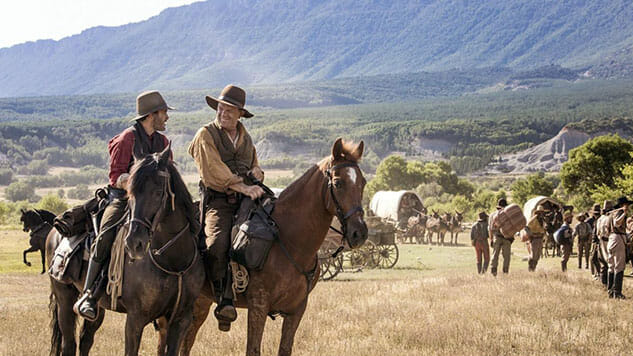The Sisters Brothers

The Sisters Brothers, Jacques Audiard’s eighth, and first English-language, film as director, is a lot like his previous film, Dheepan, in that it seems to be one thing until it isn’t, consistent only in how it changes, constantly trying to figure itself out. Whereas Dheepan begins as a quiet drama, detailing the story of Sri Lankan refugees hiding out in French tenement housing by pretending to be a nuclear family, before erupting into unmitigated bloodshed in its last moments, like a repressed memory suddenly bursting into the light, The Sisters Brothers begins with violence of mythical, gunslinger proportions—the voice of Charlie Sisters (Joaquin Phoenix) declaring the title of the film as a warning, followed by the yellow flash of gunshots between the opaque blackness of the American frontier—only to pull apart that myth as the film winds down to a warm end.
A deconstructionist take on the Western is nothing starkly new, but Audiard pays careful attention not just to the moral repugnance at the heart of American expansionism, but to the physical repugnance as well, filling The Sisters Brothers with bad teeth, horse death, vomit full of spiders, sweaty surgery and the general sentiment that living in the Oregonian and Californian wilderness in 1851 was a mostly difficult, dangerous, gross-ass endeavor. For Charlie and Eli (John C. Reilly) Sisters, the West fits their lawless acumen well, at least to the extent that indiscriminate murder, bounty hunting, projected daddy issues and nature tracking provide them with a living wage. Though Charlie thrives in the outlaw lifestyle, drinking and whoring through one tiny town after another, Eli hopes for better things, whatever that may be—a family, perhaps, with the school teacher who gave him the red handkerchief he wears around his neck—fed up with fearing for their lives and sleeping on the ground and nursing his brother’s hangovers, despite how good they’ve become at what they do.
The Sisters brothers work for the Commodore (yup, that’s Rutger Hauer, though why that’s Rutger Hauer is anyone’s guess), a criminal kingpin of sorts using preppy man-of-the world John Morris (Jake Gyllenhaal) to find a chemist who’s supposedly concocted a special formula that makes panning for gold a cinch. Morris, through sheer force of charm, befriends said science-minded Hermann Kermit Warm (Riz Ahmed), a small and lithe man not exactly built for the rugged outdoors, especially during the Gold Rush, but who charms Morris back via idealism and an intellect to match. Eventually, Audiard and regular collaborator Thomas Bidegain’s script, based on Patrick deWitt’s novel, brings the pair into uncomfortably close quarters with the Sisterses, but long after the Western’s become a dramedy which has become a chase film with touches of a historical epic. Throughout, shoot-outs accompany the Sisters brothers almost as a matter of fact, but Audiard never seems particularly interested in allowing the audience to witness the geography of his action, intent instead on letting the brutality and indifference toward life dictate the camera’s focus. Guns blazing, murder just happens and bodies fall, the brothers typically the only ones left standing. To give the audience any clarity would be to stay complicit in the romanticization of the genre, which Audiard expressly refuses to do.
-

-

-

-

-

-

-

-

-

-

-

-

-

-

-

-

-

-

-

-

-

-

-

-

-

-

-

-

-

-

-

-

-

-

-

-

-

-

-

-








































